Elden Ring's beta offers a lot of game - here's all we saw after 20 hours
Every class of the closed network test explored, and every new detail explained.
Ahead of the Elden Ring Closed Network Test - or beta by any other name - we were lucky enough to get early access to the build for a few days. And let me tell you, it is a generous helping of early game Elden Ring.
It's fair to say I played it a lot - for just short of 23 hours, in fact - and I think I've scoured pretty much every inch of West Limgrave, the starting area for the game. For the purposes of the demo, there are five character presets to choose from, though of course there'll be an extensive character creator in the main game. Each of the beta's five presets actually come with decent equipment, so there are no wrong choices - whichever one players accessing the network test this weekend decide to go for, it's really about what preferred play style they're keen to get a feel for.
Bloody Wolf is a great choice for those staunchly attached to their melee builds, but it's worth saying that enchanted knight is an incredibly strong all-rounder, with a 100% physical damage reduction shield, beautiful armour and some unique spells. However, if you want to make full use of an amazingly ostentatious spell that you can learn by completing a few challenges, you'll want to make sure you have a character with high faith stats. My best advice though would be, if you can, to try out a few different builds and see how they change your approach to Elden Ring. For my time with the game, I concentrated on and completed pretty much all of the content with three of the builds I've already mentioned - the Enchanted Knight, the Bloody Wolf, and the Prophet.
When you start Elden Ring and make your way through the (optional) tutorial cave, you'll hoist some heavy doors open and find yourself in the open world of Limgrave - and from here, you can go pretty much wherever you like. The first thing you'll likely want to do though is visit a Site of Grace - Elden Ring's equivalent of bonfires, which as per tradition you'll want to activate whenever you can. Right from the start of the game, you can fast travel freely between most Sites of Grace out in the open world simply by selecting them from your map - because, in a first from a Soulslike game, Elden Ring has a map. Once you reach out and touch grace at three separate sites, and then rest at the third, you'll be visited by Melina, who offers to play the part of a Finger Maiden - stop laughing back there - beings who serve the Two Fingers and offer guidance and aid to the Tarnished. This essentially means Melina is your level up lady, trading runes for stat improvements and filling you in on the lore of the world as you travel.
Melina will also gift you spectral Steed Whistle, which allows you to summon your horse/cow mount, whose name is Torrent. You'll definitely want to unlock Torrent as quickly as possible, as they make getting about on the open world much faster and easier. You can also engage enemies whilst on horseback - Torrent can take damage and can technically die, but will become available again once you rest up at a Site of Grace. Alternatively, if you're in urgent need of their assistance, you can sacrifice one of your health flasks to bring Torrent back into the fray immediately. Your trusty steed also has a double jump ability, which can be very handy when exploring - or escaping certain enemies.
Sites of grace do more than facilitate fast travel - from levelling up and redistributing your health and magic flasks, to setting your current spells and Ashes of War abilities - more on those shortly. Early on in the game, you're able to obtain a Wondrous Physick flask. This curious reusable resource allows you to combine items called tears to produce various effects when consumed. It's a bit of a wild card - you can give yourself a stamina boost, or blow yourself up if you aren't careful. You can reset the effects of the Wondrous Physick flask at Site of Grace, but to be honest I didn't find much use for it this early in the game. However, it'll be exciting to see what kind of bizarre concoctions we'll be able to play around with later on...
Crafting, an incredibly common staple of open world games, has made its way into Elden Ring - a first for From Software's Soulslike titles. You'll quickly notice that resources are everywhere in Elden Ring, scavenged from enemy drops and harvested from its surprisingly rich ecosystem. Plants and animals are all around in Elden Ring - this is a rich, verdant world that is still very much alive, in contrast to the decayed, desiccated Dark Souls or the twisted gore of Bloodborne. Recipes for crafting in Elden Ring can be obtained from cookbooks, and there are stacks of these in this early slice of the game, either for sale from merchants or tucked away in dungeon chests. Available items to craft include boluses that negate poison or bleed build-up, pickled turtle neck that boosts your stamina recovery for a short amount of time, and raisins that heal Torrent. It's worth having a look in your crafting menu every now and again for something that might help you out. In all honesty there's not much need for many of the items in this early access build, but it's likely there'll be much more use for them as the game gets more challenging later on down the line. And, knowing FromSoftware, there'll be some obscure little secrets hidden away in the crafting menu too.
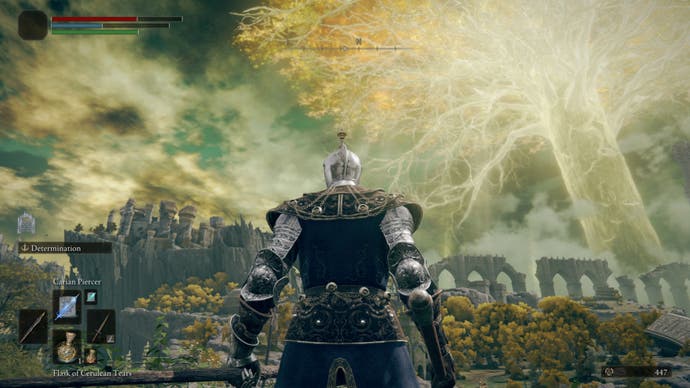
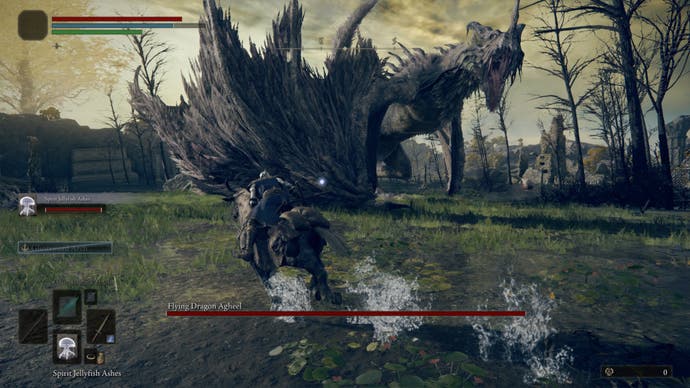
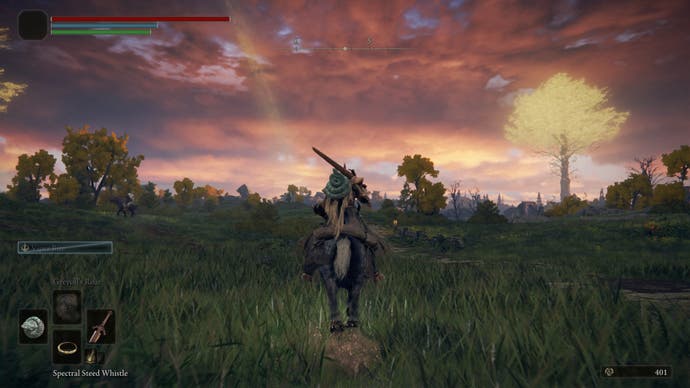
If you've generally felt a little intimidated by the level of difficulty in Soulslike games, you should know that there are lots of little touches in Elden Ring designed to give you a helping hand when you want it. Fans of the traditional From Software experience shouldn't worry - the challenge you've come to expect from the formula is still very much there - but now there are small additions woven into Elden Ring's tapestry to bolster the experience for newcomers while also making things work for an open world environment. For example, when you defeat the last one standing in a large group of enemies, you'll see that your Flasks of Crimson and Cerulean Tears, which top up your health and magic bars respectively, are partially replenished. When you die, you may have the option to respawn as usual at a Site of Grace - or, if a particular statue is nearby, at a Stake of Marika instead. These Stakes, which resemble armless statues, tend to crop up before some boss encounters, which means that although you won't have as many options as you would if you'd respawned at a Site of Grace, you can cut out those long treks back to the boss room if you so wish. You can tell when you're in a Stake of Marika's area of effect by the small statue icon that appears under your status bars on the top left corner of the screen.
Another optional assist you can find in Elden Ring is the NPC Spirit Summons, which are reusable items you'll find and collect throughout the world. These summons can be used any time you see a glowing tombstone-like icon on the left side of your screen, but they cannot be used when you're in or looking for a multiplayer session. Spirit Summons are basically a stand-in for NPC summons of previous FromSoft games, and an offline alternative to calling for help in online multiplayer. I'd recommend trying out the different summons found in the CNT; the lone wolves (confusingly, there are three of them) are great for running distraction, for example, while the sorcerer can stand back and deal magic damage from afar. If you do a little exploring, you can also find a Spirit Jellyfish summon, which can be a game-changer for one challenging boss fight in particular.
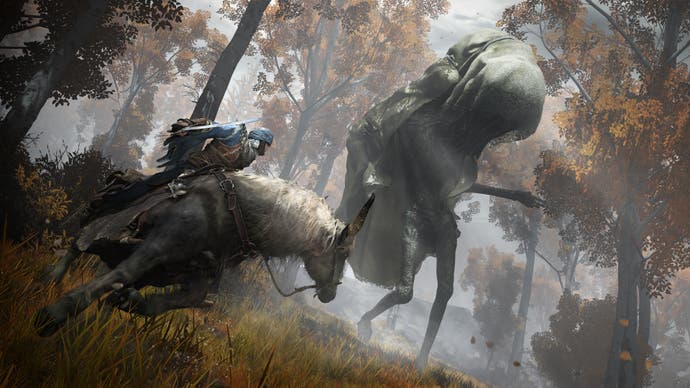
Speaking of, there are absolutely tons of optional bosses in this small slice of the game. The only one that seems key to Elden Ring's story and the overall progression of the main game is Margit the Fell Omen, who you can find on the approach to Stormveil castle. But there are many other bosses hidden away in smaller dungeons, including trolls, beastmen, zombie watchdog cats, grave wardens, and demi-humans. The rewards for besting these challenges range from new weapons to cookbooks to Ashes of War, which allow you to equip and interchange abilities in your arsenal. Not all boss fights are created equal, but most are worth experiencing - not least because the caves and catacombs in which they typically reside are hiding plenty of other secrets too. There are also many unique enemies in our early access build that aren't even considered bosses, and these can often be tucked away in the farthest reaches of the map, or may only make an appearance at a certain time of day, or night...
Fans of the traditional From Software experience shouldn't worry - the challenge you've come to expect from the formula is still very much there.
One thing I took away from this early look at Elden Ring is that the Ashes of War, while they make take some getting used to, are well worth experimenting and playing around with. These equippable effects can change the stats, resistances and damage types of your weapons and shields, and they each bestow a unique attack or action, displayed on the left side of your screen, which is initiated by pressing L2. These actions can range from Holy Ground - which summons a temporary healing circle - to Thunderbolt and Ordovis' Vortex - a lightshow of a heavy two-handed sword attack. A personal favourite L2 effect so far is Glintsword Arch, which summons multiple magic blades that hover around you like a stabby halo and strike your enemies for considerable damage. Ashes of War can be customised to your weapons and shields at any Site of Grace, but not all of them can be used on all equipment, some are permanently fixed to particular armaments, and some can only be used when a weapon is being wielded with either one or two hands. Ashes of War can be easily overlooked, especially when you're just getting started in Elden Ring, but used effectively they have the ability to really change up how you play. They made every build surprisingly versatile with a quick refresh every now and again, and visually they help make the combat of Elden Ring really shine bright.
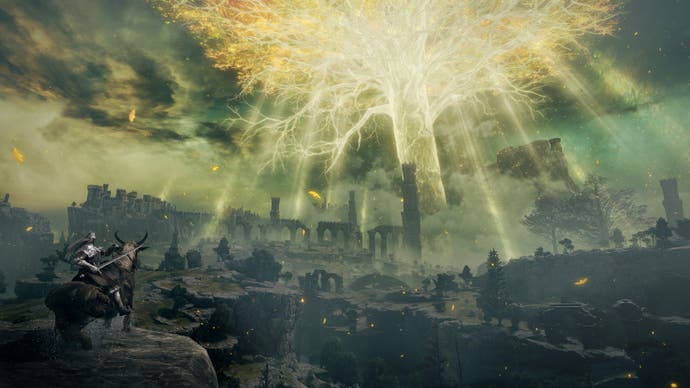
Perhaps the greatest challenge of the Elden Ring closed network test - greater even than Margit the Fell Omen - is taking down the Flying Dragon Agheel, a vast and violent creature that spawns in the northwest area of a lake, should you be foolish enough to take an amble through it. We've defeated Agheel with three different builds, and it's been interesting how each one has called for a slightly different approach to combat. It's an incredible battle every time, partially due to the fact that Agheel is best faced while mounted on Torrent, making for a thrilling showdown as the great dragon wheels and dives overhead, breathing fire as you gallop in and out of range to try and avoid great plumes of fire. It seems like you can only use right handed weapons while on horseback, so take note and make sure to make the necessary preparations ahead of time. The battle is worth riding into just for giving you a taste of the grand scale Elden Ring promises, but you can also use the item you get for defeating Agheel at a specific location in the CNT to be granted a very powerful spell. This spell needs a Faith skill level of 15 to use, so top tip: you can get a head-start on that by choosing either the Champion or the Prophet preset builds.
In case it isn't clear yet, I absolutely loved my time with Elden Ring - there are enough tweaks and touches to make this feel like a fresh take on the Souls formula, not least the absolutely stunning open world you're free to explore. But the game still manages to feel reassuringly familiar to this Soulsborne fan, while adding enough optional features to help new players feel empowered to give Elden Ring a try. This was a very generous helping of what the full game can offer, and despite sinking so many hours into it, I still came away hungry for more. There might not be a better sign of its quality than that.
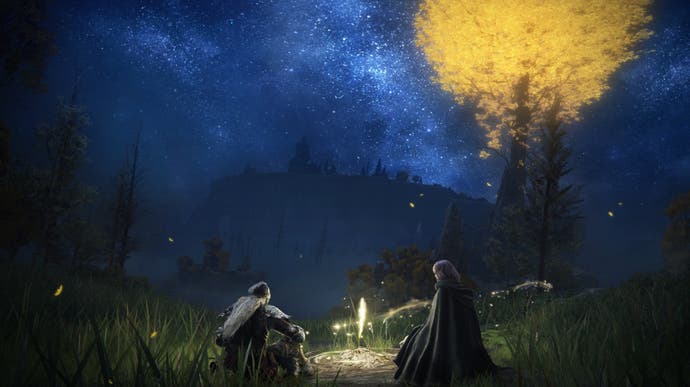



_MEGHzTK.png?width=291&height=164&fit=crop&quality=80&format=jpg&auto=webp)
.png?width=291&height=164&fit=crop&quality=80&format=jpg&auto=webp)

-Teaser-Trailer-(Directors-Cut)-_-Short-Film-2025-0-24-screenshot.png?width=291&height=164&fit=crop&quality=80&format=jpg&auto=webp)


